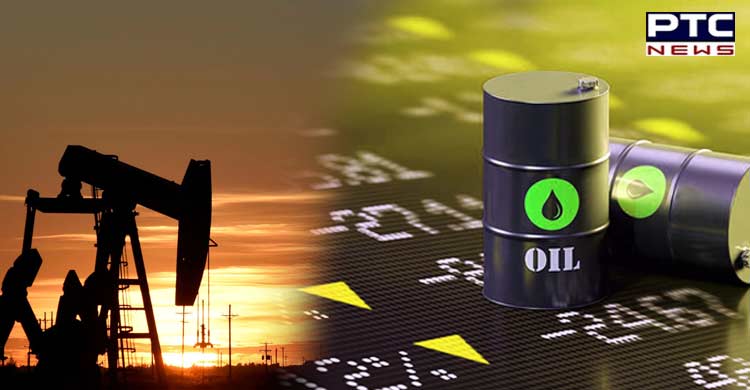

Russia-Ukraine war: Know how soaring crude oil prices will impact Indian economy
New Delhi, March 9: Crude oil prices hit a 14-year high of $140 a barrel on Monday. With the Russia-Ukraine war showing no signs of a thaw, the crude oil prices are set to surpass record high of $147.50 a barrel soon and this will significantly impact India.

Here's how the skyrocketing crude oil prices impact the Indian economy.
To meet its energy requirements, India is significantly reliant on imports. Imports account for over 86 percent of the country's crude oil requirements. As a result, the country's import bills are expected to soar. The trade deficit will expand, putting the country's current account balance under pressure.
According to the latest RBI data, India's current account deficit in the second quarter of 2021-22 was $9.6 billion, or 1.3 percent of GDP. India had a current account surplus of $6.6 billion, or 0.9 percent of GDP, in the first quarter of fiscal 2021-22.
The current account keeps track of the value of goods and services exported and imported, as well as capital movements among countries. In recent months, the trade gap has worsened. The current account deficit is likely to skyrocket as an outcome of this.
The spike in crude oil prices, however, would affect more than just the current account balance. It is expected to have a much broader impact on the Indian economy.
Also Read | Russia-Ukraine war: PepsiCo, Coca-Cola, McDonald’s, Starbucks suspends sales in Russia
"Higher oil prices hurt the current account, add to inflationary pressures and increase sensitivity to Fed rate hikes," says Dan Fineman, co-head of equity strategy for Asia-Pacific at Credit Suisse.
The jump in crude oil prices will exacerbate inflation and impede economic growth.
According to Credit Suisse, a Brent crude oil price of $120 per barrel would add $60 billion to India's import costs.
Other commodities such as gas, edible oils, fertilisers and coal have also seen price increases as a result of the ongoing Russia-Ukraine war. India's import bills could rise by another $35 billion as a result of this. The high import expenditure for crude oil and other goods is expected to drive inflation up by at least 1%.
Finance Minister Nirmala Sitharaman's Economic Survey, published in Parliament on January 31, forecasts GDP growth of 8 to 8.5 percent for the year commencing April 2022, assuming crude oil prices of $70 to $75 per barrel in 2022-23.
The price of crude oil has reached a new high. In fact, the crude oil rate has risen to nearly double the government's estimate of $70 to $75 per barrel.
Moreover, the situation appears to be deteriorating. Russia has warned that if the US and European countries completely ban Russian oil imports, the price of crude oil might skyrocket to $300 per barrel.
If the price of crude oil remains above $100 per barrel in 2022-23, it will have a significant impact on India's budget calculations. It will have a significant impact on practically all macroeconomic estimates in the Union Budget for the years 2022-23.
In terms of dealing with the high crude oil prices, there are two options. One, rising crude oil prices are passed on to customers in the form of higher retail prices for petrol, diesel and other petroleum products. It will have a cascading effect on inflation. Second, the Centre absorbs the entire oil price shock rather than passing it to the end-user. Deficits will rise as a result of this.
If the government wishes to keep its fiscal and other deficit commitments, it will have to cut spending in sectors like social welfare and infrastructure development.
Also Read | Ban on Russian oil; Ukraine's new NATO stand | Russia-Ukraine War Day 14 Live Updates
If the government decides to absorb the entire oil price shock, a $10 per barrel increase in oil price will raise inflation by roughly 49 basis points (bps) or increase the fiscal deficit by 43 bps (as a percentage of GDP), according to a Mint Street memo published by the Reserve Bank of India (RBI) in January 2019.
For the previous four months, India's retail pricing for diesel and petrol have remained unchanged. According to analysts, the government-controlled oil marketing companies have not raised retail diesel and petrol prices since November 2021 due to state elections. But now, as elections in five states are concluded, fuel prices will be increased.
On November 2, the retail price of petrol in Delhi reached an all-time high of Rs 110.04 per litre, while the retail price of diesel reached Rs 98.42 per litre. The central government reduced excise duty on petrol by Rs 5 per litre and diesel by Rs 10 per litre on November 4. The state governments also lowered the Value Added Tax (VAT). This resulted in a significant drop in the price of petrol and diesel across the country.
Inflation is exacerbated by the price of oil. The RBI's tolerance ceiling for headline inflation has already been exceeded, and any further rise will require the central bank to tighten monetary policy. A tightening of monetary policy, such as a rise in policy rates, would have a detrimental influence on economic recovery.
-PTC News
